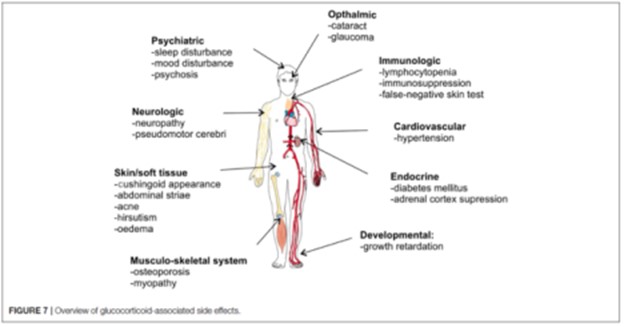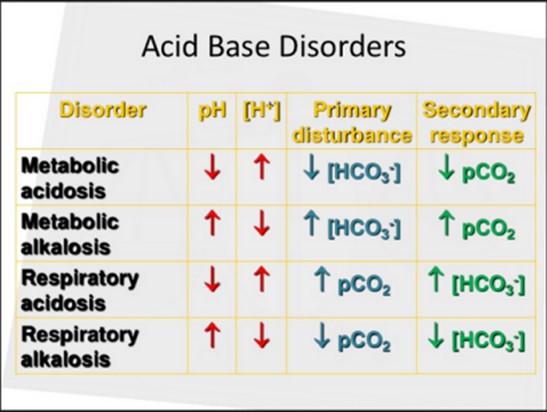A nurse is caring for a client with a history of chronic obstructive pulmonary disease (COPD) and is diagnosed with pneumonia. The client has been on a long-term regimen of methylprednisolone. Which precautions should the nurse take to prevent complications? Select all that apply.
Ensure the client receives adequate amounts of fluids
Check the client's mouth for stomatitis
Assess the client's mental status
Monitor for signs of hypokalemia
Monitor the clients blood glucose levels
Monitor the clients blood pressure for hypotension
Correct Answer : A,B,C,D,E,F
Ensure the client receives adequate amounts of fluids: This is important to maintain hydration and thin respiratory secretions, making it easier for the client to cough and clear the airways. Check the client's mouth for stomatitis: Methylprednisolone can increase the risk of developing oral candidiasis (thrush) or stomatitis, which can cause discomfort and interfere with oral intake. Regular mouth checks can help identify these conditions early for appropriate management. Assess the client's mental status: Pneumonia, particularly in individuals with pre-existing lung disease like COPD, can lead to hypoxemia, which may affect mental status. It is important to monitor the client's mental status, as changes in cognition or confusion can be indicators of hypoxia and require prompt intervention.
Monitor for signs of hypokalemia: Methylprednisolone, like other corticosteroids, can cause electrolyte imbalances, including hypokalemia (low potassium levels). Hypokalemia can have various effects on the body, including muscle weakness and cardiac dysrhythmias. Regular monitoring of potassium levels and signs of hypokalemia is important for timely management. Monitor the client's blood glucose levels: Methylprednisolone can increase blood glucose levels, particularly in individuals with pre-existing diabetes or impaired glucose tolerance. Regular monitoring of blood glucose levels is necessary to ensure proper glycemic control and prevent hyperglycemia-related complications.
Monitor the client's blood pressure for hypotension: Corticosteroids like methylprednisolone can cause fluid retention, leading to an increase in blood pressure. However, sudden withdrawal of corticosteroids can result in adrenal insufficiency and hypotension. Close monitoring of blood pressure is necessary to identify any significant changes and adjust the medication regimen accordingly.

Nursing Test Bank
Naxlex Comprehensive Predictor Exams
Related Questions
Correct Answer is C
Explanation
The pH value of 7.5 indicates alkalosis, as it is above the normal range of 7.35-7.45. The elevated bicarbonate (HCO3-) level of 34 mmol/L suggests metabolic alkalosis, as it is higher than the normal range of 22-28 mmol/L. The PaCO2 level of 40 mm Hg falls within the normal range of 35-45 mm Hg.
In this case, the primary disturbance is metabolic alkalosis, which is likely caused by the persistent vomiting leading to excessive loss of gastric acid (hydrogen ions) and chloride ions from the stomach. This loss of acid and chloride results in an imbalance of electrolytes and an increase in bicarbonate levels, leading to metabolic alkalosis.
Since there is no significant deviation from the normal range in the PaCO2 level, the respiratory system has not effectively compensated for the metabolic alkalosis. Therefore, it is considered uncompensated.
Correct Answer is C
Explanation
The pH value of 7.5 indicates alkalosis, as it is above the normal range of 7.35-7.45. The elevated bicarbonate (HCO3-) level of 34 mmol/L suggests metabolic alkalosis, as it is higher than the normal range of 22-28 mmol/L. The PaCO2 level of 40 mm Hg falls within the normal range of 35-45 mm Hg.
In this case, the primary disturbance is metabolic alkalosis, which is likely caused by vomiting leading to excessive loss of gastric acid (hydrogen ions) and chloride ions from the stomach. This loss of acid and chloride results in an imbalance of electrolytes and an increase in bicarbonate levels, leading to metabolic alkalosis.
The arterial blood gas results do not indicate any compensation. Compensation occurs when the body attempts to restore the pH balance by adjusting the respiratory or metabolic systems. In this case, there is no compensation observed because the PaCO2 level is within the normal range and not significantly altered.

Whether you are a student looking to ace your exams or a practicing nurse seeking to enhance your expertise , our nursing education contents will empower you with the confidence and competence to make a difference in the lives of patients and become a respected leader in the healthcare field.
Visit Naxlex, invest in your future and unlock endless possibilities with our unparalleled nursing education contents today
Report Wrong Answer on the Current Question
Do you disagree with the answer? If yes, what is your expected answer? Explain.
Kindly be descriptive with the issue you are facing.
